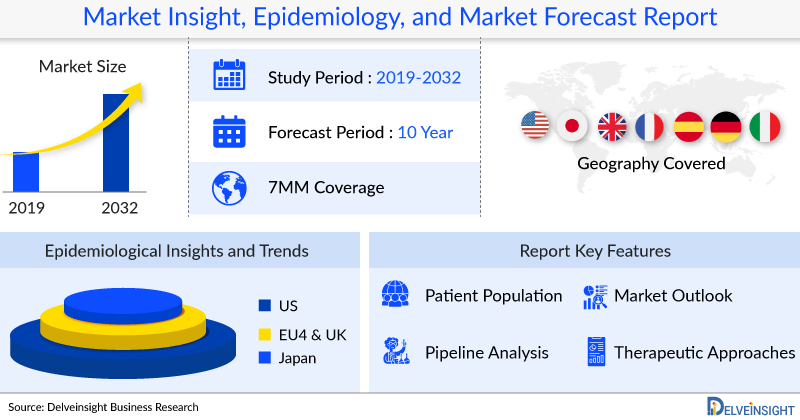Companies worldwide are actively advancing novel treatments for PKD, showing significant progress over recent years. Notable players in this field include Rocket Pharmaceuticals, Agios Pharmaceuticals, and others, who are developing innovative drugs to address this condition. Among these, RP-L301 is highly anticipated as a leading emerging therapy in the PKD treatment landscape.
DelveInsight’s “Pyruvate Kinase Deficiency (PKD) Market Insights, Epidemiology, and Market Forecast 2032” report delivers an in-depth understanding of the disease, historical and forecasted epidemiology, as well as the Pyruvate Kinase Deficiency market size, share, trends, and growth opportunities in the seven major markets (7MM) (i.e., the United States, EU4 (Germany, Spain, Italy, France), the United Kingdom and Japan).
The Pyruvate Kinase Deficiency market report covers emerging drugs, current treatment practices, market share of individual therapies, and current & forecasted market size from 2019 to 2032. It also evaluates the current treatment practice/algorithm, key drivers & barriers impacting the market growth, and unmet medical needs to curate the best of the opportunities and assess the underlying potential of the market.
Pyruvate Kinase Deficiency Overview
Pyruvate kinase deficiency (PKD) is a rare genetic blood disorder caused by low levels of the enzyme pyruvate kinase, which is essential for red blood cell function. This condition arises from mutations in the PKLR gene, leading to insufficient pyruvate kinase. Without this enzyme, red blood cells become more prone to breakdown, resulting in hemolytic anemia. PKD is inherited in an autosomal recessive pattern, meaning a child must inherit a defective gene from both parents to develop the disorder. While PKD is the second most common cause of hemolytic anemia after glucose-6-phosphate dehydrogenase (G6PD) deficiency, it is relatively rare.
PKD affects individuals across all ethnic backgrounds, though certain populations, such as the Amish, have a higher prevalence. The disorder has been most frequently reported in Europe. However, due to its rarity, PKD is often misdiagnosed or undiagnosed, making its true prevalence in the general population difficult to ascertain.
Pyruvate Kinase Deficiency Market Key Facts
-
According to NORD, pyruvate kinase deficiency (PKD) is a rare disorder affecting both men and women, though its exact frequency is not well-defined. Estimates suggest that about 1 in 20,000 Caucasian individuals may develop PKD, while clinical practice reports indicate a prevalence closer to 1 in 1,000,000 people.
-
Grace et al. (2019) noted that PKD generally follows an autosomal recessive inheritance pattern and is distributed across various geographic regions. Prevalence estimates vary widely, ranging from 1 in 1,000,000 to 1 in 20,000. Heterozygote frequencies among different populations, based on biochemical analyses, range from 0.15% to 6%.
-
A high-quality study by Christensen et al. (2020) contributed valuable data on PKD prevalence. The researchers screened 153,830 live births in the US for elevated bilirubin levels, testing those with neonatal jaundice for PKD. They identified five cases of PKD, estimating a prevalence of approximately 1 in 30,000 births.
Report Covers the In-depth Assessment of the Emerging Drugs & Key Companies. Download the Sample Report to Learn More @ https://www.delveinsight.com/sample-request/pyruvate-kinase-deficiency-market
Pyruvate Kinase Deficiency (PKD) Market
The report on the Pyruvate Kinase Deficiency (PKD) market provides a comprehensive analysis of historical, current, and projected market trends. It examines the impact of existing PKD therapies, identifies unmet needs, and explores both drivers and barriers to market growth, as well as the demand for advanced technologies.
This section offers an in-depth look at the market trends for each marketed drug and late-stage pipeline therapy. It assesses their impact based on factors such as annual therapy costs, inclusion and exclusion criteria, mechanism of action, compliance rates, market demand, patient demographics, expected launch timelines, competitive landscape, brand value, and perspectives from key opinion leaders. The data are illustrated with relevant tables and graphs to provide a clear overview of the market.
According to DelveInsight, the PKD market across the 7MM is anticipated to undergo significant changes during the study period from 2019 to 2032.
Pyruvate Kinase Deficiency (PKD) Epidemiology Assessment
The epidemiology section offers an in-depth analysis of historical, current, and projected epidemiology trends for the seven major markets (7MM) from 2019 to 2032. It identifies the factors influencing these trends through a review of various studies and research. This section also includes a detailed examination of diagnosed and prevalent patient populations, future epidemiological trends, and insights from key opinion leaders.
Learn How the Pyruvate Kinase Deficiency Market Will Evolve and Grow by 2032 @ https://www.delveinsight.com/sample-request/pyruvate-kinase-deficiency-market
Pyruvate Kinase Deficiency (PKD) Therapies Covered in the Report Include:
-
Mitapivat (PYRUKYND)
-
RP-L301
Table of Contents
1. Key Insights
2. Executive Summary
3. Pyruvate Kinase Deficiency Competitive Intelligence Analysis
4. Pyruvate Kinase Deficiency Market Overview at a Glance
5. Pyruvate Kinase Deficiency Disease Background and Overview
6. Pyruvate Kinase Deficiency Patient Journey
7. Pyruvate Kinase Deficiency Epidemiology and Patient Population (In the US, EU5, and Japan)
8. Pyruvate Kinase Deficiency Treatment Algorithm, Current Treatment, and Medical Practices
9. Pyruvate Kinase Deficiency Unmet Needs
10. Key Endpoints of Pyruvate Kinase Deficiency Treatment
11. Pyruvate Kinase Deficiency Marketed Products
12. Pyruvate Kinase Deficiency Emerging Drugs and Latest Therapeutic Advances
13. Pyruvate Kinase Deficiency Seven Major Market Analysis
14. Attribute Analysis
15. Pyruvate Kinase Deficiency Market Outlook (In US, EU5, and Japan)
16. Pyruvate Kinase Deficiency Access and Reimbursement Overview
17. KOL Views on the Pyruvate Kinase Deficiency Market
18. Pyruvate Kinase Deficiency Market Drivers
19. Pyruvate Kinase Deficiency Market Barriers
20. Appendix
21. DelveInsight Capabilities
22. Disclaimer
Media Contact
Company Name: DelveInsight Business Research LLP
Contact Person: Kritika Rehani
Email: Send Email
Phone: +14699457679
Address:304 S. Jones Blvd #2432
City: Las Vegas
State: Nevada
Country: United States
Website: https://www.delveinsight.com/

